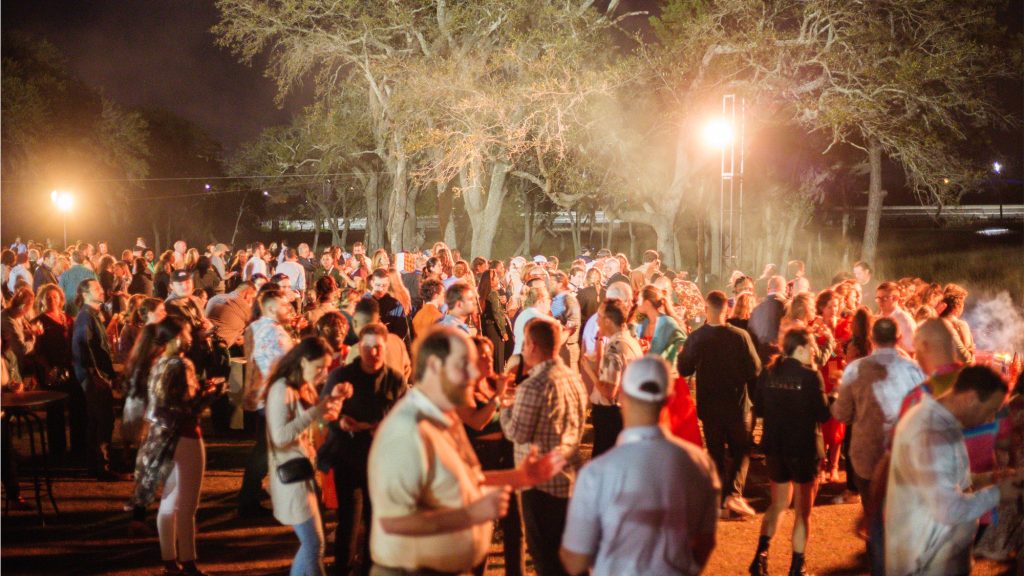Alyssa Maute Smith spent her childhood exactly how one might imagine a Charleston, S.C., childhood: out on the water surrounding her James Island home with her “very, very big” family, catching their own seafood and harvesting their own oysters. This combination of gathering together, sourcing local food, and communing with the Charleston landscape is now central to her mission as the executive director of the Charleston Wine + Food Festival (CHSWF). VinePair spoke with Smith about what’s on the menu for this year’s festival, which runs from March 6 to 10, as well as the importance of giving homegrown stories a platform.
Alyssa Maute Smith
Smith was the CHSWF’s marketing and communications director before stepping into her current executive director role, but her history with the festival goes back even further; Charleston Wine + Food was one of her early clients back when she ran her own public relations and communications firm. “I approached them because, as a native Charlestonian, I wanted to work with brands that I would be an advocate for,” she says. “Being able to tell the stories of our way of life here in the Lowcountry — how we eat and, most importantly, the people — was really special. I get to share what I’ve experienced and how I’ve grown up on a national platform, and that’s not something that everyone can say they get to do in their day job.”
Back to the Dock
When Smith’s family wasn’t harvesting seafood themselves, they paid a visit to the Backman Seafood Company on Sol Legare Road. At one point, Backman Seafood was the sole Black-owned seafood company in the state. After years in the making, CHSWF is partnering with the now shuttered Charleston institution for the Back to the Dock excursion event.
The Backman family descends from the Mosquito Fleet fishermen, who began as a group of enslaved fishermen in the early 19th century. The Mosquito Fleet battled extreme weather conditions while fishing in the Charleston area for generations, providing fresh food to South Carolinians — a legacy that continued with the Backman family.
The CHSWF event will welcome family member Sammy Backman, along with the James Beard Award-winning journalist Jamaal Lemon, to tell the family’s multigenerational story. Guests will feast on local seafood before heading out on the water to see where the family fished and to learn about the impacts of coastal hurricanes on the business.
“There’s a really rich story there,” Smith says. “It has taken us years to bring this event to life because you have to have all the right components and make sure that all of the pieces come together in order to tell an accurate depiction of their legacy.”
Global Cuisine, Local Talent
Along with seafood, Charleston’s culinary scene has historically revolved around Southern and New American food. But Smith has noticed several international cuisines — like Vietnamese and Filipino — spicing things up in recent years.
This year, West African restaurant Bintü Atelier is hosting one of CHSWF’s signature dinners, which welcome guest chefs, brewers, distillers, and winemakers to local restaurant kitchens. Smith says the recent diversification of Charleston food reflects the city’s roots: “I think it makes a lot of sense, harkening back to the melting pot of culture that we have in the South, from African to Caribbean to European,” Smith says. “All of those influences together have inspired what we eat and the way that we eat here.”
‘By Charlestonians, For Charlestonians’
The stories told at CHSWF blend centuries of Charleston history with the freshest local gastronomic talents. The event’s largest tasting experience, the Culinary Village, features “neighborhoods” that nod to various facets of the Charleston foodscape: “Shucktown” emphasizes coastal seafood; “Farm Fresh” honors local farmers; and “Grillin’ and Chillin’” celebrates open-fire barbecues.
Beyond the five days of the annual festival, the CHSWF nonprofit runs year-round programs to support the local restaurant industry, including externships, mentorship and scholarship programs, and technical training to prepare local high school and college students for culinary careers. “The festival is produced here by Charlestonians, for Charlestonians,” Smith says. “We live in this community, we invest our dollars in this community, and we give back to this community. The stories that we tell and the people we work with are our neighbors, our community members, and individuals that we support all year, not just in the creation of this wine and food festival.”
Smith hopes to continue storytelling and deepening connections with the folks establishing Charleston’s ever-evolving food and drinks scene. “I’ve learned that this festival and this organization is very important to this local community,” she says. “It’s a catalyst for building connections and relationships, and those are the things I want to see preserved.”
Tickets are still available for several events on this year’s CHSWF schedule, including the Back to the Dock event and the Culinary Village experience. Visit the CHSWF schedule for tickets — and then sink your teeth into the stories that give Charleston its flavor.
This article is sponsored by the Charleston Wine + Food Festival.
The article Rich Food, Richer History: The 2024 Charleston Wine and Food Festival appeared first on VinePair.
